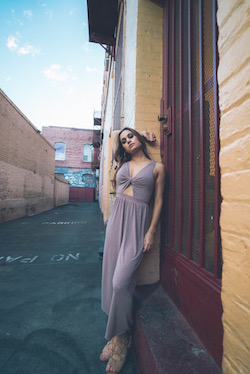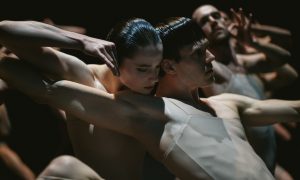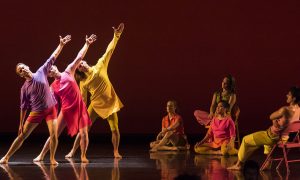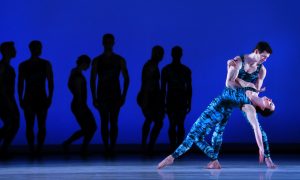When I was a sophomore in college, I was focused on each small task in front of me — one after the other. It is so hard to comprehend your “big picture” when you’re staring a computer screen for hours trying to study for a test, or in rehearsals until midnight for the next performance.
When she was a sophomore in college, Erica Klein saw her “big picture”. She saw an opportunity in front of her that would drastically change her future for the better, and she chased it. Now, the young rising star has a weekly gig teaching in L.A. at Millennium Dance Complex, she teaches for Groove Dance Competition, has thousands of followers on Instagram and has her sights set on a big future.

Erica Klein. Photo by Lexi Theodore .
Here, Dance Informa chats with Klein about her life, teaching and her long-term goals in the dance industry.
Where and when did you begin dancing?
“My mom loves musicals, so I grew up listening to show tunes in the car and renting musicals from the library. Because of this, dance, music and performance were always inside me. I started dancing and choreographing in the living room at age three, and continued to choreograph on friends just for fun all throughout my childhood. My parents didn’t want to put me in formal dance training because they thought learning a strict technique might squelch the creativity that I was expressing. It wasn’t until I was 10 years old that I took my first official jazz class at a local studio.”
How old were you when you knew dancing would be your career of choice?
“Quickly after I starting dancing, I realized that I loved dance in a way that was abnormal. However, early on I was very realistic about the difficulties and unlikelihood of making a career out of it. It was my desire to be a professional dancer starting at age 14, but I wasn’t confident enough in my talent to turn that dream into a real goal. I made a couple leaps toward being a professional like becoming homeschooled when I was 16 to focus on training and traveling to LA, but in the back of my mind, I still thought I needed a back-up plan (which is why I ended up going to college). When I was 18, I started to get recognition on my Instagram for my improv videos. That is when I started to believe that I had something special and could potentially turn it into a career!”

Erica Klein. Photo by Sarah McCreanor.
When did you catch the choreography bug?
“I’ve always loved to choreograph, even before I was in formal dance training. Setting little dances on my friends was my favorite activity for playdates, talent shows or even creative school projects. I was making up dance routines, complete with formation changes, even when I didn’t have any dancers to set them on. I always felt like the music told me exactly what to do. I just didn’t have the dance vocabulary yet. When I started taking dance classes, my choreography was literally jazz tricks back to back. It took many years to evolve my style from solely technical moves into real, genuine movement.”
Do you teach for any dance conventions?
“I currently teach for Groove Dance Competition.”
What are the differences for you between teaching for conventions and teaching a weekly class in LA?
“I think of my weekly class at Millennium as a conversation, a two-way exchange of information. My ‘students’ are often my peers or dancers I look up to in their own styles. There is so much to learn from every dancer in the room, so it’s not all about me. I simply facilitate an environment where we can all share and inspire each other.
When I teach classes at a convention, I try to focus on giving the young dancers specific information on how to transition from being a convention kid to a professional. I give them the advice that I would have needed to hear, from the perspective of someone who was recently in their shoes.”
What are some everyday challenges you face in the dance industry or just regular life?
“In the dance world, there is this gigantic pressure to be constantly putting out work, creating and one-upping everyone else. I’m very hard on myself and very critical of my work. My perfectionism often keeps me from experimenting, finishing choreography or sharing my work both online and in a class setting. I’ve found methods to handle it, but it will always be a constant battle of mine.”

Erica Klein. Photo by Kenny Vu.
How do you find a work-life balance?
“Ever since I fell in love with dance, there honestly hasn’t been much else I’ve found to be even a fraction as fulfilling as dance is. I’m so intrigued by every aspect of this dance career, I don’t need much else at this stage in my life. I love being productive, so I try to tie in my socializing with activities like doing a collaboration, having a freestyle session or taking a dance class with friends. Perhaps I’ll grow out of this phase of being completely fulfilling with dance, but for now I’m grateful that my passion is so strong. It’s sure made working my butt off a lot easier!”
What do you enjoy most about teaching?
“I’m a dance nerd. I love being analytical about dance. Being able to explain how I approach movement, my career, intention or whatever I decide to speak about in class is very fulfilling. I’ve always found that I enjoy the dance projects or jobs that challenge my brain rather than just my body. Running a class is one of the most complicated, multilayered things you can do. I also love sharing my style. I love teaching because I get the opportunity to let people into my brain. I love to explain my choreographic decisions, the metaphors in my movement, the way I think about music, the way I relate to the lyrics on a personal level. All that information is so necessary for people to fully experience my work. It can’t be absorbed by just watching the final product on Instagram.”
How do you keep your choreography ideas fresh week to week?
“I take lots of dance classes! I get very inspired by taking a wide variety of classes. That’s how my style continues to evolve.”
What are your long-term goals in the dance industry?

Erica Klein. Photo by Sarah McCreanor.
“I would love to choreograph and direct more music videos or even movies or TV shows one day. However, my big picture goal is to continue the existing quest to make contemporary more relevant in both the dance industry and popular culture. This commercialized contemporary fusion style that I’ve fallen in love with is so dynamic and interesting. I believe it has potential to be as relevant as hip hop dance is currently. It is able to tell a story and reach a deep level of artistry. Contemporary is starting to find its way into the light thanks to many amazing choreographers who have done such impressive work in the commercial world already. My goal is to one day be a leader in that movement and show the world how truly incredible this style is.”
What is your best advice for young dancers who aspire to teach and choreograph when they are older?
“Put in the time and effort to make quality work. Invest in your training, and focus on making your creations the best they can possibly be. Be patient and diligent in your work, and always fight for quality over quantity. It’s easy to put out a bunch of content and just see if anything blows up. But to be truly proud of your product is the real accomplishment.
Second, remember that success in a dance career is based more on intelligence and observation rather than talent. Listen, learn and absorb as much as you can while being a critical thinker. Even though being a dancer/choreographer is a physical career, your brain is more important than your body.”
By Allison Gupton of Dance Informa.















